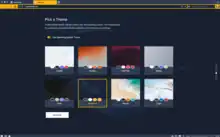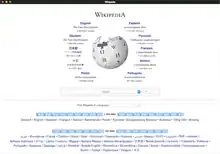Vivaldi (web browser)
Vivaldi (/vɪˈvɑːldi, vəˈv-/ [12][13]) is a freeware, cross-platform web browser with a built-in email client developed by Vivaldi Technologies, a company founded by Tatsuki Tomita and Jon Stephenson von Tetzchner, who was the co-founder and CEO of Opera Software. Vivaldi was officially launched on 6 April 2016.[14][15]
 | |
 Vivaldi running on macOS | |
| Developer(s) | Vivaldi Technologies |
|---|---|
| Initial release | 6 April 2016[1] |
| Stable release(s) | |
| Preview release(s) | |
| Repository | |
| Written in | C++[8] |
| Engines | Blink (WebKit on iOS/iPadOS), V8 |
| Operating system |
|
| Platform | IA-32, x86-64, ARM (macOS, Linux & Android only) |
| Size |
|
| Available in | 53 languages[10] |
List of languages Albanian, Arabic, Armenian, Basque, Belarusian, Bulgarian, Catalan, Chinese (Simplified), Chinese (Traditional), Croatian, Czech, Danish, Dutch, English, Estonian, Finnish, French, Frisian, Galician, Georgian, German, Greek, Hungarian, Icelandic, Ido, Indonesian, Italian, Japanese, Korean, Kurdish, Latvian, Lithuanian, Lojban, Macedonian, Norwegian (Bokmal), Norwegian (Nynorsk), Persian, Polish, Portuguese (Brazil), Portuguese (Portugal), Romanian, Russian, Sardinian, Scots Gaelic, Serbian, Slovak, Slovenian, Spanish, Spanish (Peru), Swedish, Turkish, Ukrainian, Vietnamese | |
| Type | Web browser |
| License | Proprietary freeware[lower-alpha 1] |
| Website | vivaldi |
Although intended for general users, it is first and foremost targeted towards technically-inclined users as well as former Opera users disgruntled by its transition from the Presto layout engine to a Chromium-based browser that resulted in the loss of many of its distinctive features.[14][16] Despite also being Chromium-based, Vivaldi aims to revive the features of the Presto-based Opera with its own proprietary modifications.[17][18]
As of April 2023, Vivaldi has more than 2.4 million active users.[19]
History
Vivaldi began as a virtual community website that replaced My Opera, which was shut down by Opera Software in March 2014.[20] Jon Stephenson von Tetzchner was angered by this decision because he believed that this community helped make the Opera web browser what it was. Tetzchner then launched the Vivaldi Community—a virtual community focused on providing registered users with a discussion forum, blogging service, and numerous other practical web services—to make up for My Opera's closure. Later, on 27 January 2015, Vivaldi Technologies launched[21] the first technical preview of the Vivaldi web browser.[22] Its name comes from the Italian composer Antonio Vivaldi, which, according to Tatsuki Tomita, is an easy name to be remembered and understood worldwide.[15]
In September 2021, Vivaldi replaced Firefox as the default browser on the Manjaro Cinnamon Community Edition to a mixed reception from the Linux community, as Vivaldi is not open source software;[23] Manjaro developers cited this decision on Vivaldi's feature-richness and exceptional customisability.[24] In December 2021, Vivaldi became the first web browser to be available for the Android Automotive operating system used in the Swedish electric vehicle manufacturer Polestar's Polestar 2. For safety purposes, the browser can only be used when the car is parked.[25]
Features

Vivaldi has a minimalistic user interface with basic icons and fonts, and, optionally, a colour scheme that changes based on the background and design of the web page being visited.[26] The browser also allows users to customise the appearance of UI elements such as background colour, overall theme, address bar and tab positioning, and start pages.[27] According to CEO Jon von Tetzchner, Vivaldi's unique customisability is how the browser caters to experienced users.[28]
Vivaldi comes with built-in ad blocker, pop up blocker and tracker blocker. These features block intrusive ads, help web pages load faster, and protect against malicious ads and trackers.[29] It comes with built-in e-mail client with IMAP and POP3 support. Some of the Mail features are saved searches and offline message search.[30] The browser can be used as a feed reader to save RSS and Atom feeds.[31] It also comes with built-in Vivaldi Calendar to manage events in the browser.[32] Vivaldi Translate is powered by Lingvanex and can instantly translate websites, without the need for third-party extensions.[33]
Vivaldi features the ability to "stack" and "tile" tabs, annotate web pages, and add notes to bookmarks.[34][35] Furthermore, users can place digital bookmarks on a "speed dial" page for quick access and harness "quick commands" to search bookmarks, browsing history, open tabs, and settings.[36] Vivaldi is built around and based on web technologies such as HTML5, Node.js, React.js, and numerous NPM modules.[37] As of Technical Preview 4, Vivaldi also supports numerous mouse gestures for actions like tab switching and keyboard activation.[28] Vivaldi can also be set to a "Chromeless UI", which gives users more screen real-estate and the ability to focus on a single page without distractions.[38] To accommodate users who prefer to use a large number of tabs at the same time, Vivaldi supports hibernation for both individual tabs and for tab stacks, freeing resources while the user does not actively use those tabs.
Extensions
Vivaldi can use many browser extensions developed for Google Chrome and Firefox (they both use the WebExtensions API[39]), and users can install extensions directly from the Chrome Web Store. Most of these work properly in Vivaldi, with the exception of user interface customisations due to its visual changes to the Chromium source code.[40][41]
Market share
Starting with version 2.10, Vivaldi changed its user agent string to mimic a generic build of Chromium, which results in it not being recorded as a unique browser and causing a decrease in its recorded market share.[42]
Reception
Ars Technica reviewer Scott Gilbertson wrote about version 1.0 in April 2016. He praised its innovative features, such as its tab handling, while noting that it will most likely remain a niche browser and not see widespread uptake.[43] In October 2018, Gilbertson gave version 2.0 a very positive review and stated that Vivaldi is now his usual browser and that he would be hard put to go back to a browser without its unique features.[44]
Ghacks editor-in-chief Martin Brinkmann wrote about the privacy of Vivaldi in January 2018. He criticised the lack of an opt-out option for the unique user ID it generates to get general statistics about the browser's userbase, but commented that the unique ID "is easy enough to delete" and "it is different anyway if you use Vivaldi on multiple devices".[45]
TechRadar's managing editor, Desire Athow, published a review of Vivaldi in August 2021. In the review, Athow praised browser's focus on the productivity, highlighting its advanced tab management features such as tab hibernation, multi-tab management, and split-screen view. However, he also pointed out that Vivaldi's extensive feature set and high degree of customizability can also be overwhelming for a casual user, making it clear that browser is not designed for everyone.[46]
Notes
- The user interface (UI) layer of the browser is closed-source. The C++ backend and the open-source Chromium codebase used in the browser is released under BSD-3.[11]
References
- Andrii, Degeler (6 April 2016). "Vivaldi 1.0 tries to reverse web browser simplification trend". Ars Technica. Retrieved 8 April 2016.
- "Minor update (7) for Vivaldi Desktop Browser 6.2". 6 October 2023. Retrieved 6 October 2023.
- "Minor update(3) for Vivaldi Android Browser 6.2". 29 September 2023. Retrieved 29 September 2023.
- "Minor update for Vivaldi iOS Browser 6.3". 16 October 2023. Retrieved 18 October 2023.
- "YouTube feed fixes – Vivaldi Browser snapshot 3160.27". 17 October 2023. Retrieved 18 October 2023.
- "Catching up – Vivaldi Android Browser snapshot 3165.4". 18 October 2023. Retrieved 18 October 2023.
- "The very first – Vivaldi iOS Browser snapshot 3159.4". 12 October 2023. Retrieved 12 October 2023.
- "Vivaldi browser: Interview with Jon Stephenson von Tetzchner". utappia.org. 21 September 2016. Archived from the original on 5 November 2016. Retrieved 22 December 2016.
- "Download Vivaldi". vivaldi.com. Vivaldi Technologies. Retrieved 29 January 2017.
- "Vivaldi version 1.13.1008.32 for Windows (7+)". Vivaldi Technologies. 25 November 2017.
- Picalausa, Julien (9 July 2021). "Why isn't Vivaldi browser open-source?". Vivaldi. Retrieved 21 August 2022.
Vivaldi is built in roughly three layers: 1. Chromium, the foundation for our browser. 2. A lot of backend C++ code to support unique features like Ad blocker and Notes. 3. Our UI for desktop (HTML+CSS+JS) and Android [...] Roughly 92% of the browser's code is open source coming from Chromium, 3% is open source coming from us, which leaves only 5% for our UI closed-source code.
- Vivaldi 5.3: Tweak and tune your browser with the new Editable Toolbars. Vivaldi. 1 June 2022. Retrieved 2 October 2022 – via YouTube.
- What's New in Vivaldi | April 2022. Vivaldi. 6 April 2022. Retrieved 3 October 2022 – via YouTube.
- Shankland, Stephen (27 January 2015). "Ex-Opera CEO composes Vivaldi, a new Web browser". CNET. CBS Interactive. Archived from the original on 27 January 2015.
- "Vivaldi: testamos o navegador de internet que tem personalização completa". Tecmundo (in Portuguese). Grupo NZN. 4 November 2015. Retrieved 7 November 2015.
- Minic, Ivan (10 February 2015). "Jon S. von Tetzchner: We will (re)create a browser you love". Medium.
- Gilbertson, Scott (6 March 2015). "Hands-on with Vivaldi, the new Web browser for power users". Ars Technica. Condé Nast. Archived from the original on 2 May 2015. Retrieved 2 May 2015.
- "Vivaldi is building "Opera as it should've been"". www.arstechnica.com. Ars Technica. 16 January 2017. Retrieved 16 January 2017.
- "We're in Control". vivaldi.com. Retrieved 22 August 2021.
- Shankland, Stephen (23 January 2014). "Ex-CEO picks up where Opera left off, launching Vivaldi site". CNET. CBS Interactive.
- "Vivaldi Tech Preview 1 Just Arrived". Vivaldi Technologies. 27 January 2015. Retrieved 28 August 2022.
- Dagenborg, Joachim (6 February 2015). "Vivaldi browser hits 500,000 downloads in first 10 days". Reuters. Oslo, Norway. Archived from the original on 8 February 2015. Retrieved 2 May 2015.
- Borisov, Bobby (9 September 2021). "Manjaro Cinnamon Edition Decided to Switch from Firefox to Vivaldi". Linuxiac. Retrieved 13 October 2023.
- "Vivaldi Replaces Firefox as the Default Browser on Manjaro Linux Cinnamon". betanews. 9 September 2021. Retrieved 18 September 2021.
- "Vivaldi in Polestar: The first browser for Android Automotive OS". Vivaldi Browser. 22 December 2021.
- Lardinois, Frederic (8 March 2015). "Vivaldi Is Quickly Becoming The Alternative Browser To Beat". TechCrunch.
- Brinkmann, Martin (2 June 2015). "Latest Vivaldi snapshot introduces interface scaling". Ghacks. Retrieved 19 June 2015.
- Frederic, Lardinois (16 July 2015). "Vivaldi Browser Gets New Customization Options, Mouse Gestures And Experimental Chrome Extension Support". TechCrunch. AOL Inc. Retrieved 16 July 2015.
- "Ad Blocker – fast and free, no extensions needed".
- "Mail | an email client built into your browser | Vivaldi".
- "Feed Reader | Read feeds from the sources you choose | Vivaldi".
- "Calendar | Manage private and shared calendars | Vivaldi".
- "Translate | Private translation on desktop and Android | Vivaldi".
- Williams, Owen (28 April 2015). "Latest Vivaldi browser preview brings useful tab stacking feature and more". The Next Web.
- Paul, Ian (28 April 2015). "This is neat: You can stack and tile browser tabs in the Vivaldi beta browser for power users". PCWorld.
- Clarke, Victor (27 January 2015). "Vivaldi Browser: a Quick Look at the Opera Successor". hackerspace.lifehacker.com. LifeHacker. Archived from the original on 15 November 2020. Retrieved 10 May 2015.
- Williams, Owen (27 January 2015). "Meet Vivaldi, a new browser from the former CEO of Opera". The Next Web.
- Ødegaard, Ruarí (17 July 2015). "Snapshot 1.0.228.3 – With Chromeless UI". Vivaldi Technologies. Archived from the original on 2 April 2016.
- "MDN: Browser Extensions". 8 June 2023.
Extensions, or add-ons, can modify and enhance the capability of a browser. Extensions for Firefox are built using the WebExtensions API cross-browser technology. The technology for extensions in Firefox is, to a large extent, compatible with the extension API supported by Chromium-based browsers such as Google Chrome, Microsoft Edge, and Opera. In most cases, extensions written for Chromium-based browsers run in Firefox with just a few changes.
- Williams, Owen (16 July 2015). "Sick of Chrome? Vivaldi can now run your favorite extensions". The Next Web. Retrieved 1 June 2017.
- "Using Extensions in Vivaldi". Vivaldi Browser Help. 29 January 2016.
- "Vivaldi 2.10: No strings attached". Vivaldi Technologies. 19 December 2019.
- Gilbertson, Scott (28 April 2016). "Even at 1.0, Vivaldi closes in on the cure for the common browser". Ars Technica. Retrieved 29 April 2016.
- Gilbertson, Scott (19 October 2018). "Vivaldi 2.0 review: The modern Web browser does not have to be so bland". Ars Technica. Retrieved 19 October 2018.
- Brinkmann, Martin (30 January 2018). "Vivaldi browser and privacy". Ghacks. Retrieved 22 January 2022.
- Athow, Desire (29 August 2021). "Vivaldi browser review". TechRadar. Retrieved 20 September 2023.